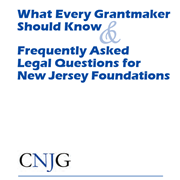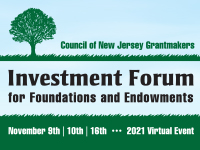Site Search
- resource provided by the Forum Network Knowledgebase.
Search Tip: Search with " " to find exact matches.
What does the family philanthropy landscape look like? How has it changed across the last decade, and what do those changes mean for the field?
Join National Center for Family Philanthropy to discuss the findings of the Trends in Family Philanthropy 2025 report.
We will explore:
The changes in philanthropic focus for many family philanthropies
How grantmaking practices are evolving, and whether community needs are coming to the fore
How philanthropies are learning about new ideas and approaches
The changes in family dynamics, shifts in how the next generation are being engaged, and the factors that sustain and impede family engagement
Changes in the make-up of boards
What the findings suggest about future trends
Speakers include:
Miki Akimoto, Chief Impact Officer at the National Center for Family Philanthropy (NCFP) and Erin Hogan is a Managing Director and Philanthropic Market Executive for Bank of America’ Philanthropic Solutions
There will be time at the end of the session for Q&A.
About the Trends report
The Trends survey captures and tracks leading trends in the field of family philanthropy. Conducted every five years, this research identifies emerging issues, changes in funding priorities and governance practices, innovative approaches to giving and decision making, and anticipated future giving patterns and practices among US-based philanthropic families nationally. Ultimately, it aims to equip donors with data they can apply to their decision making.
In this second session of GCIR’s Anti-Authoritarian Funder Learning Series, we will lean into the wisdom of advocates, pro-democracy funders, and influential thinkers to unpack the patterns of autocratic governance taking hold in the United States, and explore how philanthropy can help avert our democracy’s decline.
While broad swaths of the American public are grappling with the unmistakable and fearful evidence of our authoritarian drift, the good news is that we do not have to go it alone. The backsliding of democratic norms, attacks on civil society, and centralization of abusive executive power is a story that has played out countless times in fledgling and long-standing democracies alike. The brave, strategic, and resilient resistance of everyday citizens in those countries—along with the documentation and analysis of journalists and historians—offers us not just an understanding of the authoritarian playbook (such as vilifying migrant communities to rationalize immigration enforcement), but a roadmap out of it.
Join us as we learn from international advocates, as well as pro-democracy funders and advocates. Together, we will examine the strategies that have been deployed globally against democratic repression—and, crucially, how philanthropy can resource the movement infrastructure needed over the next 18 months to prevent the consolidation of autocratic rule in the United States.
This tool for unstaffed foundations includes an accountability self-assessment and a legal checklist. It is divided into nine topic sections, each of which is divided into three levels, which can help foundations tailor the tool to meet their specific interests and needs. Also included are an Excel spreadsheet to help tabulate responses, an extensive accountability resource list, and a glossary of key words and concepts used in the tool.
This weekly funder briefing webinar series welcomed New Jersey-based grantmakers along with national funders and provided an opportunity for grantmakers to hear from a wide range of nonprofit experts. This series started on March 13, 2025, less than a month after the first executive order was issued and continued through April 24, 2025. The written summaries of each recording are listed below.

This guide was designed to help the state’s philanthropic community understand their ethical, legal, and fiduciary requirements and obligations.

Dates & Times
Tuesday, November 9 - 1:00 to 5:00 p.m.
Wednesday, November 10 - 1:00 to 5:00 p.m.
Tuesday, November 16 - 1:00 to 5:00 p.m.
CEOs, executive directors, CFOs, trustees, investment committee members, and finance managers of foundations and endowed nonprofits gathered together over three afternoons of learning and discussion during CNJG’s 2021 Investment Forum for Foundations and Endowments.
Attendees heard from leading asset managers, financial service institutions, professional advisors and practitioners who shared best practices and valuable insights focused on successful endowment management. Pointed, strategic, and masterful keynote speeches and educational workshop sessions explored a wide range of timely and useful topics, such as impact and ESG investing, gift acceptance policies, alternative investments, governance and due diligence, and so much more.
Sustainable philanthropy thrives on careful and skillful stewardship of the corpus. This signature event grew out of the Council of New Jersey Grantmakers’ Finance and Investment Affinity Group convenings, which have long offered CFO’s, investment committee members, board chairs and others with oversight of their endowment, exposure to a wide range of representatives, as well as thoughtful expertise and perspectives from the investment community.
Access Whova until May 16, 2022!
Registrants can access all three plenary sessions and 11 concurrent sessions on Whova for six months after the event, until May 16, 2022. You can log in with the same email and password you used to access the event. Visit Whova.
For questions, please contact Anna D'Elia, Manager of Programs and Learning.
Late last year, the Texas legislature passed a series of bills targeting migration at the Texas-Mexico border. This included Senate Bill 4 (SB4), which criminalizes anyone suspected of crossing the border without authorization to enter or re-enter into Texas. Since then, a series of legal decisions have created confusion and uncertainty. Similarly, Florida has passed legislation targeting community IDs and driver's licenses for immigrants and criminalizing the transportation of undocumented immigrants into the state.
As battleground border states, Florida and Texas have had an immense influence across the country, as other states have stood up similar anti-immigrant bills. Most recently the governor of Iowa signed SF2340, a bill which made it a state crime for immigrants with prior deportation orders from the U.S. to reside in the state. The Louisiana governor recently introduced SB 388, which, as in Florida, criminalizes undocumented immigrants entering or reentering the state. Meanwhile, Georgia has introduced legislation to punish local governments for having sanctuary city policies.
In an election year when immigration is the top issue in the minds of many voters, these policies exacerbate xenophobic, anti-immigrant, and racist sentiments that further dehumanize and criminalize immigrant and refugee communities while also expanding state powers to detain, deport, and terrorize undocumented individuals. To respond to this moment, organizations are leveraging different strategies–from litigation to organizing–to prevent the implementation of these policies and create a more welcoming country for all.
Join us for a panel conversation with frontline leaders, which will be followed by a funder-only discussion.
Speakers
Jennefer Canales-Pelaez, Texas Policy Attorney & Strategist, Immigrant Legal Resource Center (ILRC)
Erica Johnson, Founding Executive Director, Iowa Migrant Movement for Justice (Iowa MMJ)
Dauday Sesay, Founder & Executive Director, Louisiana Organization for Refugees and Immigrants (LORI) & National Network Director, African Communities Together (ACT)
Moderator
Cairo Mendes, Senior Director of State and Local Programs, GCIR
